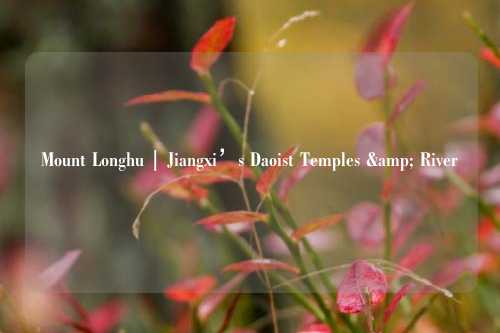Mount Longhu | Jiangxi’s Daoist Temples & River
The Enchanting Beauty of Mount Longhu
Mount Longhu, located in Jiangxi Province, is a scenic wonderland famous for its mesmerizing landscapes and deeply rooted religious significance. The mountain, which stretches along the banks of the Gan River, has long been celebrated for its striking views, ancient temples, and Daoist heritage. Mount Longhu’s dramatic peaks, lush forests, and tranquil riverside settings offer a unique opportunity to connect with nature and spirituality. As one of the most important Daoist pilgrimage sites in China, the area has attracted pilgrims, tourists, and scholars for centuries, all eager to explore its natural beauty and profound cultural history.
Exploring the Daoist Temples of Mount Longhu
Mount Longhu is renowned for its Daoist temples, which are central to its cultural and spiritual significance. These temples, many of which date back to the Tang and Song Dynasties, have become major landmarks in the region, drawing countless visitors seeking to immerse themselves in Daoist philosophy and practices.

The most famous of these temples is the Longhu Mountain Temple, often regarded as the heart of Daoist worship in the area. Located near the base of the mountain, this temple complex includes several halls and pavilions, each dedicated to different Daoist deities. The architecture of the temple is a testament to traditional Chinese design, with sweeping roofs, intricate carvings, and serene courtyards that invite visitors to reflect and meditate.
Visitors to Longhu Mountain Temple can experience the spiritual atmosphere that permeates the site. The temple is still active, and many Daoist rituals are performed here. The serene environment, combined with the sacredness of the temple, makes it a perfect place for contemplation, meditation, and a deeper understanding of Daoist beliefs.
The Majestic Longhu River and Scenic Views
The Longhu River, which winds its way through the mountain range, adds another layer of beauty and tranquility to the region. Flowing gently along the foot of Mount Longhu, the river is a vital part of the area's ecosystem and an essential feature of its scenic charm. The river offers visitors a chance to experience the serene landscape from a different perspective. Taking a boat ride on the Longhu River provides a unique view of the surrounding temples, cliffs, and lush vegetation that make the area so visually captivating.
The Longhu River is also significant in Daoist traditions, with many legends and myths surrounding its waters. It is believed to be a sacred river, imbued with spiritual energy that enhances the meditation and prayer experiences of those who visit the area. The river's calm waters, paired with the surrounding mountains and temples, create a tranquil environment that encourages relaxation and self-reflection.
The Spiritual and Cultural Significance of Mount Longhu
Mount Longhu is one of the foremost Daoist mountains in China, with a history that stretches back over 1,500 years. As the birthplace of Daoism’s Quan-Zhen school, the mountain holds immense spiritual importance in the Daoist tradition. The Quan-Zhen school was founded during the Jin Dynasty by the renowned Daoist priest Wang Chongyang. His teachings and spiritual practices laid the foundation for much of the Daoist philosophy that continues to influence modern Daoism today.
In addition to its spiritual significance, Mount Longhu has also been a center for education and intellectual pursuits. Many scholars and practitioners of Daoism have visited the mountain over the centuries to study its teachings, and the surrounding temples have served as centers for Daoist learning. The presence of these ancient sites, combined with the teachings and practices of Daoism, makes Mount Longhu a place of great cultural importance.
Hiking and Outdoor Adventures on Mount Longhu
For those who enjoy outdoor activities, Mount Longhu offers numerous hiking trails that wind through its beautiful natural surroundings. The mountain’s terrain is both rugged and scenic, with cliffs, forests, and valleys providing a variety of hiking experiences for adventurers of all levels.
One of the most popular hikes is the ascent to the top of the mountain, where visitors are rewarded with breathtaking panoramic views of the surrounding landscape. From the summit, hikers can take in the sight of the Longhu River winding through the valley below, as well as the dense forests and towering peaks of the mountain. Along the way, hikers may also encounter various temples and shrines, each offering a quiet place for reflection or a moment to admire the surrounding beauty.
For those seeking a less strenuous experience, there are many shorter trails that lead through the lower slopes of the mountain. These paths take visitors through lush forests, past serene lakes, and alongside gentle streams. The peaceful surroundings of these trails make them ideal for leisurely walks or quiet moments of reflection.
The Natural Wonders of Mount Longhu
The natural beauty of Mount Longhu is an essential part of its allure. The mountain is covered with dense forests, which are home to a wide variety of plant and animal species. The lush greenery and diverse flora make the area a haven for nature lovers, while the rich wildlife adds to the mountain’s mystique.
One of the most notable features of Mount Longhu is its dramatic rock formations. The mountain’s jagged peaks rise sharply from the landscape, creating a breathtaking contrast against the softer, rolling hills of the surrounding region. These towering cliffs are not only stunning to look at, but they also add to the sense of awe and reverence that many feel when visiting the mountain.
Throughout the region, visitors can explore caves, grottoes, and other natural features that highlight the mountain’s geological significance. Some of these caves are believed to have been used by ancient Daoist monks for meditation, adding a spiritual dimension to the exploration of the natural environment.
Mount Longhu’s Connection to Chinese Myths and Legends
Mount Longhu is steeped in Chinese mythology, with countless legends surrounding its sacred mountains, rivers, and temples. One of the most famous myths associated with the mountain is the story of the Dragon King, a powerful deity believed to control the waters of the Longhu River. According to legend, the Dragon King was once a mortal man who ascended to heaven after performing a series of heroic deeds. As a reward, he was granted dominion over the river and its waters.
The mountain is also known for its connection to various Daoist immortals, who are said to have once lived or meditated here. These legends, passed down through generations, continue to be an integral part of the cultural fabric of the region. Visitors to Mount Longhu can explore these myths by visiting the temples and shrines dedicated to these figures, gaining insight into the spiritual and mythical significance of the mountain.
Daoist Practices at Mount Longhu
As one of the foremost centers of Daoism in China, Mount Longhu is a place where visitors can learn about and engage in Daoist practices. Throughout the year, various Daoist rituals and ceremonies are held at the mountain’s temples, offering a glimpse into the spiritual life of the Daoist community.
Visitors interested in learning more about Daoist philosophy can participate in meditation sessions, where they can practice techniques such as breath control, visualization, and stillness. These practices are designed to cultivate inner peace and harmony with the natural world, reflecting the core values of Daoism.
In addition to meditation, the mountain is also a place where visitors can explore other Daoist practices, such as Tai Chi, qigong, and traditional healing methods. Many visitors come to Mount Longhu to deepen their understanding of these practices and experience the spiritual benefits they offer.
Experiencing Local Culture and Cuisine
Beyond its spiritual and natural attractions, Mount Longhu is also a place where visitors can experience the local culture and cuisine. The surrounding area is home to small villages where visitors can interact with local residents and learn about the traditional way of life.
The cuisine of the region is influenced by the natural bounty of the area, with an emphasis on fresh ingredients such as vegetables, fish, and wild herbs. Local specialties include dishes like fish cooked with herbs, wild mushrooms, and freshly harvested vegetables. The flavors of Mount Longhu’s cuisine reflect the region’s connection to nature and its rich agricultural heritage.
In addition to the food, visitors can also explore the local handicrafts and traditional arts. Many artisans in the area specialize in wood carving, pottery, and textile weaving, producing beautiful items that reflect the culture and history of Mount Longhu. These handcrafted items make for excellent souvenirs and provide a tangible connection to the region’s cultural heritage.
The Lasting Appeal of Mount Longhu
Mount Longhu continues to captivate visitors with its breathtaking landscapes, rich cultural history, and profound spiritual significance. Whether you’re exploring its Daoist temples, hiking its trails, or simply taking in the natural beauty of the area, Mount Longhu offers an experience that is both deeply enriching and deeply peaceful.
As a place of natural beauty, cultural richness, and spiritual significance, Mount Longhu remains a timeless destination for travelers seeking connection to China’s ancient traditions. Whether for spiritual renewal, outdoor adventure, or cultural exploration, Mount Longhu offers an experience that lingers long after the journey ends.
















